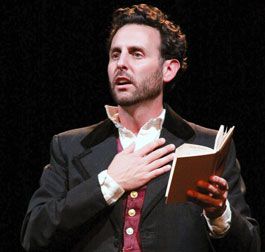home | north bay bohemian index | the arts | stage | review

Photograph by Eric Chazankin
SONG OF MYSELF: Gabriel Grilli portrays Walt Whitman as a brash young man.
Body Eclectic
'Becoming Walt Whitman' uneven, engrossing
By David Templeton
Walt Whitman is often thought of as the elderly, bearded, slightly crazy-looking gentleman in the famous photograph taken not long before his death in 1892. It is the younger, cockier, more defiant Walt Whitman though, depicted on the cover of Leaves of Grass, who is the focus of Santa Rosa playwright David Beckman's uneven but engrossing new work Becoming Walt Whitman, now running in the Studio at Sixth Street Playhouse.
Directed by Russell Kaltschmidt, the play attempts to identify the various youthful events and relationships that might have influenced his groundbreaking poetry. As Whitman, Gabriel Grilli is not always convincing, especially with his attempts to depict Whitman's aura of anarchistic social exhibitionisms as in-your-face bravado hiding a lifelong ache. We see what Grilli is getting at, but he more often than not comes off as the "pompous ass" Whitman was once described to be by the 19th-century geologist John Peter Lesley.
And who knows, that may be part of Beckman's point. Whitman might have been a pompous ass—and perhaps his poetry would not have been as challenging, fierce, humane and groundbreaking without that particular aspect of his personality.
The cast, most of whom play at least two characters, are a bit hit-and-miss, shining in some roles while struggling in others. Steve North, who first appears as Orson Fowler, the famous Manhattan publisher and phrenologist, does his best work as Walt Whitman Sr., suffering from a debilitating stroke, his dueling love and hatred of his poet son conspicuous in every snarled word. Jacqueline Wells, who plays Walt's mother, as well as his surprisingly open-minded landlady, is especially effective in the latter, bawdy and funny, and Anthony Abate, though not so convincing as Oliver Wendell Holmes, is riveting as Walt's cruel, bullying older brother Jesse. Especially strong is Peter Warden, who is proving to be one of Sonoma County's most promising young actors. As Edward, Walt's autistic younger brother, Warden gives one of the best performances of the year.
The star of the show, though, is Beckman's bold, questioning script, suggesting that Whitman's genius may have grown directly from the circumstances of his life. Whitman's homosexuality, which some scholars still try to deny, is addressed without apology, most vividly in a second-act scene of seduction and self-declaration. More surprising, though, is the hint of a reverse-Oedipal relationship with his mother, with Whitman's mother showing obvious sexual yearnings for her son. Especially intriguing is Beckman's suggestion that Whitman's stream-of-consciousness free-verse style may have been inspired by Edward's desperately fevered attempts at communication.
In the play, it is Edward who first utters the phrase "leaves of grass," and a whole string of other pasted-together phrases Whitman made famous. How much is strictly true and how much is simply the playwright's conjecture? Who knows? As biography, Becoming Walt Whitman may occasionally be more poetry than fact, but as theater, it's memorable, inventive and uniquely challenging.
'Becoming Walt Whitman' runs Friday–Sunday through Oct. 24 in The Studio at the Sixth Street Playhouse. Friday–Saturday and Oct. 21 at 8pm; 2pm matinees, Saturday–Sunday. 56 W. Sixth St., Santa Rosa. $10–$25. 707.523.4185.
Send a letter to the editor about this story.
|
|
|
|
|
|